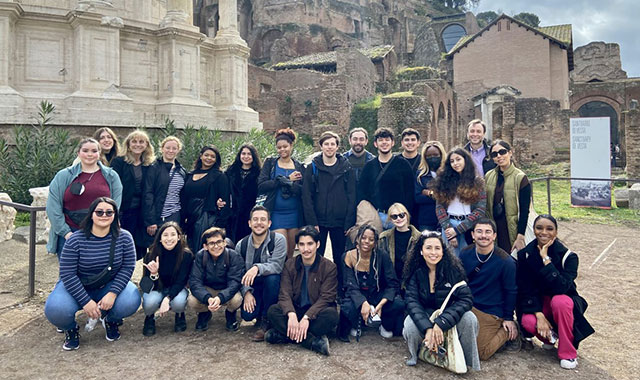Literature and Communication
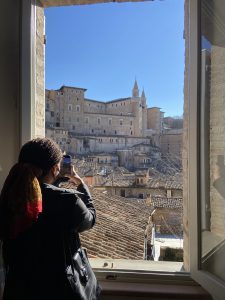 Unlike many study abroad programs, which involve registrations at foreign institutions and administrative hurdles to transfer courses, the COLFA Semester in Urbino offers UTSA courses taught by UTSA faculty or by University of Urbino faculty who have been vetted and approved by UTSA. The courses have been carefully selected to fit into UTSA degree plans and will appear seamlessly in ASAP. Moreover, since you will remain a full-time UTSA student during your semester abroad you will have access to UTSA services such as financial aid and library resources and will not encounter difficulties with minimum credit-hour requirements for financial aid or scholarships.
Unlike many study abroad programs, which involve registrations at foreign institutions and administrative hurdles to transfer courses, the COLFA Semester in Urbino offers UTSA courses taught by UTSA faculty or by University of Urbino faculty who have been vetted and approved by UTSA. The courses have been carefully selected to fit into UTSA degree plans and will appear seamlessly in ASAP. Moreover, since you will remain a full-time UTSA student during your semester abroad you will have access to UTSA services such as financial aid and library resources and will not encounter difficulties with minimum credit-hour requirements for financial aid or scholarships.
Supplemental art and cooking classes are also available during the semester
Important Dates for Spring 2024
See some of the important events and trips scheduled for the semester. Many of the details are still being finalized, so some dates and trip destinations may vary. Consult the printable schedule for more details including class meeting times.
| September 10 | List of participating students finalized |
|---|---|
| September 28 | Commitment fee of $1000 due by 4:00 pm (see the Spring 2024 Canvas Organization for payment instructions). If you do not see the Spring 2024 Urbino Canvas Organization in your Canvas Dashboard, contact Dr. Drew Stephen or Dr. Bridget Drinka to be added |
| October 30 | $1750 balance of first payment due (remaining payments will be invoiced in ASAP and due on January 15, February 15, and March 15) |
| January 27 | Arrival in Rome at Leonardo da Vinci International Airport (FCO) no later than 12:30 pm; charter bus to Urbino departs promptly from the airport at 2:30. Anticipated arrival in Urbino at 6:30 pm. |
| January 28 | 9:00 GEV Orientation Lunch at Mensa 3:00 Urbino tour |
| January 30 | Classes begin. Please consult the printable schedule for class times |
| February 1 | 9:00 Organic Farm Tour 1:00 Welcome Lunch |
| February 2 | Guided tour of Pesaro (public bus) including Rossini's birth house, Civic Museum, and historic fish market |
| February 3 | 9:00 Urbino historic tour including oratorios and Rafaello's birth house 11:00 Ducal Palace tour |
| February 8 | Day trip to Bologna |
| February 15-18 | Extended excursion to Rome |
| February 22 | Day trip to Perugia |
| February 29 | Day trip to Assisi |
| March 7-10 | Extended excursion to Verona and Venice |
| March 11-17 | Urbino Spring Break |
| March 21 | Optional Mountain Hiking |
| March 28 | Day Trip to Ravenna |
| April 4-7 | Extended excursion to Siena and Florence |
| April 11-13 | Optional Mini-Excursion to Matera |
| April 22 | Final Presentations/Final Exams/Final Papers and Projects |
| April 23 | Studio cleaning & check out Farewell Dinner |
| April 24 | Studio check out Dorm Check out |
| April 25 | Early-morning dorm checkout for 5 am bus to Rome. All students must depart from Italy on this day |
Course Information
The following 16 credit hours of courses are offered during the Spring 2024 semester.
The focus will be especially relevant to students in the English, Communication, History, Art History, Modern Languages, and Global Affairs programs. Students in the Sociology, Psychology, Multidisciplinary Studies, and Honors College programs are also welcom. Graduate versions of these courses are also available. If you are a graduate student interested in the COLFA Semester in Urbino, please contact us for more information.
| ENG 3113/4974/5633 | The Influence of Dante |
|---|---|
| ENG 3213/4213/5223/5943 | Boccaccio and Chaucer |
| COM 4413 | Communication and Humility |
| HIS 4953 | Special Studies in History: History and Culture of Italy |
| FL 1034 | Elementary Italian |
Course Descriptions
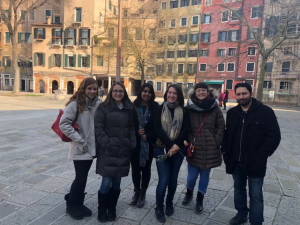 The Influence of Dante. Dante’s Divine Comedy, especially the Inferno, has served as a source of inspiration for countless authors and thinkers across the globe. This class will read the Inferno alongside some of the twentieth and twenty-first century poems in English most directly inspired by Dante’s work. We will also keep journals reflecting on all of the public art, monuments, and businesses dedicated to Dante across Italy to reflect on what this author has come to signify to Italy and the world beyond. Students will do original analysis of an artistic work (novel, poem, film, television show, painting, sculpture, or new media) that attempts to reinterpret a passage of Dante’s work. The Influence of Dante will be offered as the following cross-listed courses. Consult with your advisor to select the course number that best satisfies the requirements of your degree plan:
The Influence of Dante. Dante’s Divine Comedy, especially the Inferno, has served as a source of inspiration for countless authors and thinkers across the globe. This class will read the Inferno alongside some of the twentieth and twenty-first century poems in English most directly inspired by Dante’s work. We will also keep journals reflecting on all of the public art, monuments, and businesses dedicated to Dante across Italy to reflect on what this author has come to signify to Italy and the world beyond. Students will do original analysis of an artistic work (novel, poem, film, television show, painting, sculpture, or new media) that attempts to reinterpret a passage of Dante’s work. The Influence of Dante will be offered as the following cross-listed courses. Consult with your advisor to select the course number that best satisfies the requirements of your degree plan:
- ENG 3113 Studies in Individual Authors
- ENG 4974 Seminar for English Majors
- ENG 5633 Topics in the Study of Literature
Boccaccio and Chaucer. The writing of fourteenth-century English author, Geoffrey Chaucer was undoubtedly influenced more by fourteenth-century Italian Giovanni Boccaccio than by any other source. Long before modern conventions of plagiarism, Chaucer borrowed the Italian author’s plots, settings, and story structures repeatedly. However, more than a mere plagiarist, Chaucer creatively adapted everything he took from Boccaccio in a special way. This class will read Boccaccio’s Il Filostrato in translation alongside Chaucer’s Troilus and Criseyde as well as portions of Il Decameron, Il Filocolo, and Il Teseida alongside the various Canterbury Tales that they inspired. Students will write their own analyses of Chaucer’s artistic choices in borrowing from and changing Boccaccio’s work. Boccaccio and Chaucer will be offered as the following cross-listed courses. Consult with your advisor to select the course number that best satisfies the requirements of your degree plan:
- ENG 3213 Chaucer
- ENG 4213 Topics in English Prior to 1500
- ENG 5223 Medieval Literature
- ENG 5943 Topics in Major English Authors
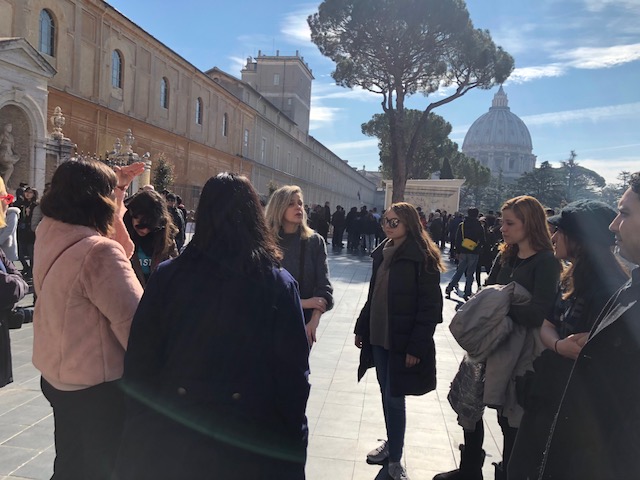 COM 4413 Communication and Humility. This course examines human development from birth to course participants’ current stage, using the metaphor of journeys. The course covers self and other awareness, listening, knowing, teaching, and leading, and examines these topics from a diverse set of references spanning the past 5,500 years of scholarship and wisdom to present. The course cites scholars, writers and speakers from Eastern and Western civilizations. The course concludes with a focus on the nature of humility in communication considering the wisdom of the ages.
COM 4413 Communication and Humility. This course examines human development from birth to course participants’ current stage, using the metaphor of journeys. The course covers self and other awareness, listening, knowing, teaching, and leading, and examines these topics from a diverse set of references spanning the past 5,500 years of scholarship and wisdom to present. The course cites scholars, writers and speakers from Eastern and Western civilizations. The course concludes with a focus on the nature of humility in communication considering the wisdom of the ages.
HIS 4953 Special Studies in History: History and Culture of Italy. This course provides students with the opportunity to acquire knowledge and understanding of Italy and the richness and diversity of its culture. The course will consist of lectures and discussions covering the following topics: Geography and geology; Italian history and its political structure; art, architecture, and design; language and literature; music and theatre; fashion design and cinema; culinary traditions and trends; popular traditions including sports, daily life and social customs.
FL 1034. Beginning Language Study Abroad. Opportunity to begin developing oral and written communication skills in the target language, along with enhanced comprehension skills in listening and reading. Linguistic and cultural immersion. May be repeated up to 8 semester credit hours in each language.
Spring 2024 Faculty
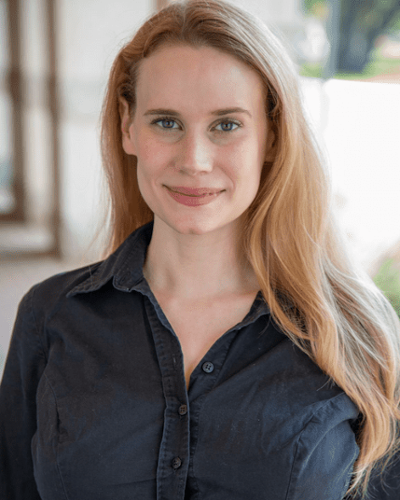 Dr. Kimberly Fonzo is an Associate Professor in the English Department at UTSA. This will be her second time teaching in Urbino. She earned her BA in English and Theatre at Hanover College and her MA and PhD in Medieval English Literature at the University of Illinois Urbana Champaign. Dr. Fonzo’s recent book, Retrospective Prophecy and Medieval English Authorship (University of Toronto Press, 2022) illuminates how authors represented themselves as prophets and how this resulted in their reputations being coopted by later audiences with various political aims. Although Dr. Fonzo’s research focuses on English authorship, her work often intersects with Italian studies because English authors, especially Geoffrey Chaucer, drew from Italian influences. Dante Alighieri is probably the world’s most famous author claiming to be a prophet, and Dr. Fonzo is thrilled to be teaching a course on his influence on modern authors. During this semester in Italy, students will keep running journals of all of the monuments to Dante they can find to reflect on his cultural influence as well. Giovanni Boccaccio is another fourteenth-century Italian author whose lighthearted and hilarious stories deserve more attention, especially because they inspired nearly all of Geoffrey Chaucer’s works. In addition to teaching courses on Medieval Literature, Dr. Fonzo has taught classes on Drama and Acting and has directed a number of student plays. She has also taught a course on performing literature aloud in the UTSA Honors College and regularly finds new ways to perform literature with her classes. Dr. Fonzo enjoys teaching in the medieval city of Urbino, where learning is never confined to the classroom.
Dr. Kimberly Fonzo is an Associate Professor in the English Department at UTSA. This will be her second time teaching in Urbino. She earned her BA in English and Theatre at Hanover College and her MA and PhD in Medieval English Literature at the University of Illinois Urbana Champaign. Dr. Fonzo’s recent book, Retrospective Prophecy and Medieval English Authorship (University of Toronto Press, 2022) illuminates how authors represented themselves as prophets and how this resulted in their reputations being coopted by later audiences with various political aims. Although Dr. Fonzo’s research focuses on English authorship, her work often intersects with Italian studies because English authors, especially Geoffrey Chaucer, drew from Italian influences. Dante Alighieri is probably the world’s most famous author claiming to be a prophet, and Dr. Fonzo is thrilled to be teaching a course on his influence on modern authors. During this semester in Italy, students will keep running journals of all of the monuments to Dante they can find to reflect on his cultural influence as well. Giovanni Boccaccio is another fourteenth-century Italian author whose lighthearted and hilarious stories deserve more attention, especially because they inspired nearly all of Geoffrey Chaucer’s works. In addition to teaching courses on Medieval Literature, Dr. Fonzo has taught classes on Drama and Acting and has directed a number of student plays. She has also taught a course on performing literature aloud in the UTSA Honors College and regularly finds new ways to perform literature with her classes. Dr. Fonzo enjoys teaching in the medieval city of Urbino, where learning is never confined to the classroom.
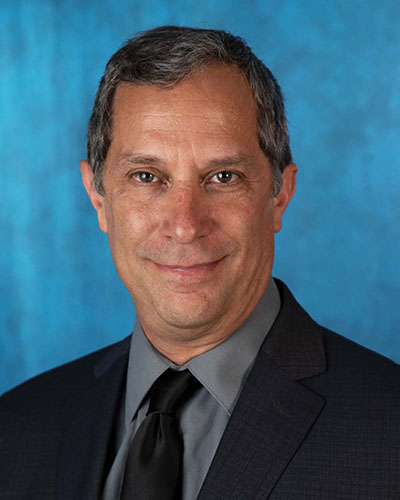 Dr. H. Paul LeBlanc III is a Professor in the Department of Communication at UTSA. He holds a Ph.D. in Communication from Southern Illinois University at Carbondale (2000), and M.A. in Communication from Louisiana State University (1992), and a B.A. in Philosophy from St. Mary’s University of San Antonio, Texas. Dr. LeBlanc’s forthcoming book, Communication and Humility: A Journey focuses on human development over the lifespan. The text draws form diverse sources from ancient to modern, including ancient Egyptian, Greek, Roman, Chinese scholars, as well as Middle Age, Medieval and Renaissance European scholars. His personal journey, outlined in the book, describes influences from Italian saints Alphonsus Maria de Ligouri and Gerard Majella, as well as the scientific approach of Galileo Galilei.
Dr. H. Paul LeBlanc III is a Professor in the Department of Communication at UTSA. He holds a Ph.D. in Communication from Southern Illinois University at Carbondale (2000), and M.A. in Communication from Louisiana State University (1992), and a B.A. in Philosophy from St. Mary’s University of San Antonio, Texas. Dr. LeBlanc’s forthcoming book, Communication and Humility: A Journey focuses on human development over the lifespan. The text draws form diverse sources from ancient to modern, including ancient Egyptian, Greek, Roman, Chinese scholars, as well as Middle Age, Medieval and Renaissance European scholars. His personal journey, outlined in the book, describes influences from Italian saints Alphonsus Maria de Ligouri and Gerard Majella, as well as the scientific approach of Galileo Galilei.
Dr. LeBlanc specializes in interpersonal, relational and family communication and communication education, and teaches courses in research methods. He has published in the Journal of International Business Disciplines, Medical Research Archives, Journal of Marketing Communications, Journalism and Mass Communication Educator, Journal of Strategic Innovation and Sustainability, Journal of Competitiveness Studies, Quarterly Review of Business Disciplines, International Journal of Interdisciplinary Research, International Journal of Motorcycle Studies, International Journal of Linguistics and Communication, and Advances in Social Sciences Research Journal. He has received funding from the National Science Foundation for his Stat Tree project. His primary vocation is in teaching.
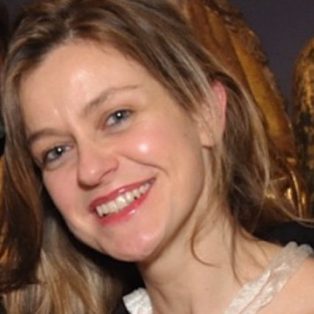 Dr. Grazia Fachechi is an Assistant Professor of Art History at the University of Urbino, Department of Humanities, where she has taught undergraduate and graduate students for more than twenty years. She received her Bachelor and Master degrees in Urbino and did post-graduate work in other cities: Florence (certificate in Museology and Art Criticism at the International University of Art – UIA), Perugia (PhD in Art History at the University of Perugia) and Rome (Diploma of Specialization in Medieval and Modern Art History at Sapienza University). She currently lives in Rome.
Dr. Grazia Fachechi is an Assistant Professor of Art History at the University of Urbino, Department of Humanities, where she has taught undergraduate and graduate students for more than twenty years. She received her Bachelor and Master degrees in Urbino and did post-graduate work in other cities: Florence (certificate in Museology and Art Criticism at the International University of Art – UIA), Perugia (PhD in Art History at the University of Perugia) and Rome (Diploma of Specialization in Medieval and Modern Art History at Sapienza University). She currently lives in Rome.
Dr. Fachechi’s principal fields of expertise are illuminated manuscripts (specifically works preserved in the Vatican Library) and wooden sculptures. She is the author of a book on Jacopo da Fabriano who was one of the favorite miniaturists of the Renaissance Pope Pius II and two books on wooden sculptures. The most recent is a catalogue of the most important wooden sculpture collection in Italy (housed in the National Museum of Palazzo Venezia in Rome) and was funded by the Getty Foundation of Los Angeles.
She has also published research on paintings, both from the Medieval and Renaissance ages. She is very interested in the text-image relationship, both in the religious context, with special regard to the iconography of the Passion of Christ, and in the lay context, with particular interest in iconographical themes of Classical Antiquity and the visual illustration of ancient literary works (especially those by the Latin writers Plauto and Seneca) in the Medieval and Renaissance eras.
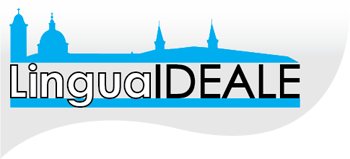 The Italian language courses are taught by certified instructors at Lingua Ideale Urbino working under the auspices of the University of Urbino “Carlo Bo”. Lingua Ideale is a professional language school offering courses of Italian language and culture to foreigners. The curriculum for the COLFA Semester in Urbino has been designed to meet the requirements of the foreign language courses at UTSA while also incorporating local aspects of Italian culture.
The Italian language courses are taught by certified instructors at Lingua Ideale Urbino working under the auspices of the University of Urbino “Carlo Bo”. Lingua Ideale is a professional language school offering courses of Italian language and culture to foreigners. The curriculum for the COLFA Semester in Urbino has been designed to meet the requirements of the foreign language courses at UTSA while also incorporating local aspects of Italian culture.

